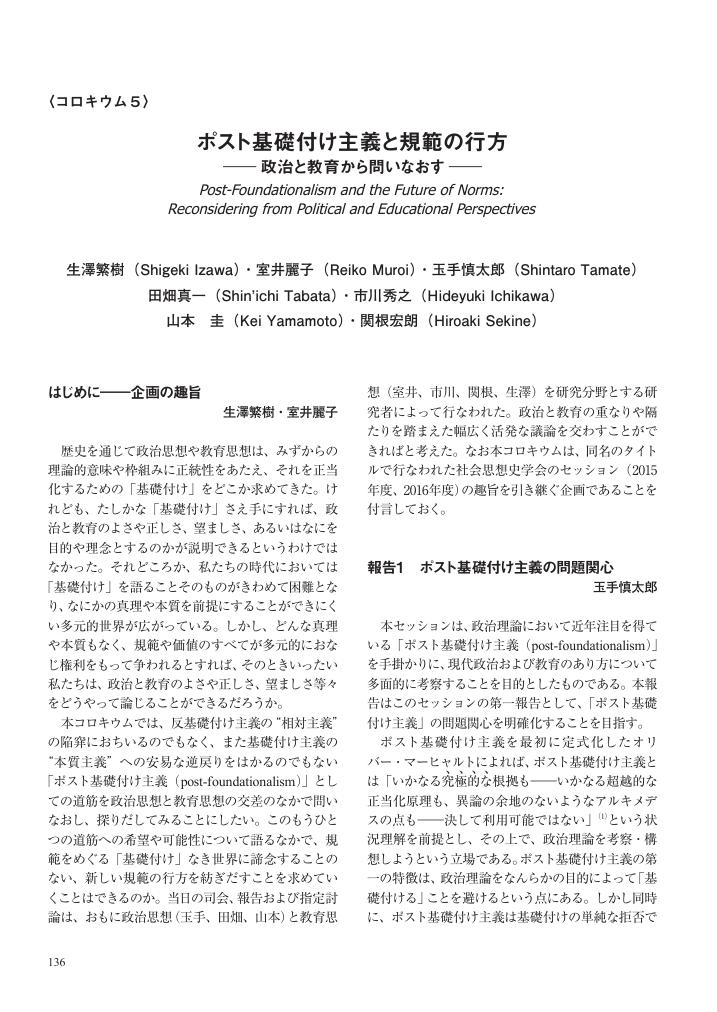- 著者
- 生澤 繁樹
- 出版者
- 一般社団法人 日本教育学会
- 雑誌
- 教育学研究 (ISSN:03873161)
- 巻号頁・発行日
- vol.82, no.4, pp.543-557, 2015 (Released:2016-05-18)
- 参考文献数
- 46
政治や教育における「代表」や「表象」という意味での “representation” の機能と作用について考察する。とくにこれまでのカリキュラムの公共性をめぐるポリティクスを中心的に取り上げながら、この問題を考えることが現代社会における代表制デモクラシーのあり方にとどまらず、参加政治の意味それ自体を根本的に問いなおし、そこに暗に設定されたコンピテンシーという教育上の問題を再び浮き彫りにするということを試論的に示していく。
- 著者
- 生澤 繁樹
- 出版者
- 教育哲学会
- 雑誌
- 教育哲学研究 (ISSN:03873153)
- 巻号頁・発行日
- vol.2006, no.93, pp.67-84, 2006
This paper examines Charles Taylor's idea of self-becoming in his cultural-pluralistic philosophy with a focus on his “anti-naturalistic” notion of the self. Although Taylor and his essay “The Politics of Recognition” have been introduced as the philosophy of multiculturalism or communitarianism in contemporary educational studies, it is not well understood that his cultural-pluralistic ideas are inspired, influenced and invoked by his sympathy with modern Romanticism and antipathy against modern naturalism concerning the concept of self-understanding. I characterize his philosophy of self-becoming as “anti-naturalism” and attempt to clarify his contributions to education including multicultural education.<BR>First, this paper conducts an analysis of Taylor's original notion of the “selfinterpreting” self with reference to his stance against modern natural sciences of man. Through this examination, we recognize that Taylor proposes the dialogical and hermeneutic notion of the self or self-becoming against the disengaged, neutral, or atomistic view of the self in natural sciences.<BR>Second, I present his “anti-naturalistic” philosophy of self-becoming as one based upon his positive evaluation of the ideas of individuality and authenticity in modern Romanticism. This is a view that an individual self is constituted by language and hence embedded in community, culture and history. I argue that the Romantic idea of the self is central to his “anti-naturalist” interpretation of the self as he views Romanticism as a reactionary movement against the analytic science of man in Enlightenment.<BR>Finally, as Taylor claims that the world of education is the main locus of multiculturalism, I examine his contribution to education including multicultural education. The conclusion runs as follows : Taylor's “anti-naturalistic” philosophy suggests the possibilities of multicultural education for us to rethink modern education from the standpoint of his Romantic appreciation of the originality of the individual and culture, while at the same time his philosophy has difficulties precisely because of that position.
1 0 0 0 OA ポスト基礎付け主義と規範の行方 : 政治と教育から問いなおす(コロキウム5)
- 著者
- 生澤 繁樹 室井 麗子 玉手 慎太郎 田畑 真一 Ichikawa Hideyuki 山本 圭 関根 宏朗
- 出版者
- 教育思想史学会
- 雑誌
- 近代教育フォーラム (ISSN:09196560)
- 巻号頁・発行日
- vol.27, pp.136-144, 2018 (Released:2019-09-07)
1 0 0 0 政治学との接合による規範的教育学の再構築
- 著者
- 高宮 正貴 児島 博紀 生澤 繁樹 橋本 憲幸 室井 麗子 森岡 次郎 杉田 浩崇 虎岩 朋加 平石 晃樹 鵜海 未祐子 関根 宏朗 岸本 智典 市川 秀之 田中 智輝
- 出版者
- 大阪体育大学
- 雑誌
- 基盤研究(B)
- 巻号頁・発行日
- 2020-04-01
これまで、教育学と政治学の接合の仕方は、①教育政策を政治学の方法で分析すること、②シティズンシップ教育として政治「を」教育すること、の2点に止まっていた。しかし本研究では、教育の規範を問う観点から、上記の接合の仕方とは異なった以下の3つのあり方を探究する。【1A】教育政策をいかに正当化すべきか(教育の分配的正義)【1B】教育は人々の生にどのように作用し、いかに包摂と排除を可能にしているのか(教育の生政治)【2】統治の対象かつ主体でもある人間は、いかにして形成されるのか(政治的主体の育成)これらの探究を通して、正義論、権力分析、市民性教育論を統合することで、規範的教育学の再構築を行う。
- 著者
- 生澤 繁樹
- 出版者
- 教育哲学会
- 雑誌
- 教育哲学研究 (ISSN:03873153)
- 巻号頁・発行日
- vol.2006, no.93, pp.67-84, 2006-05-10 (Released:2010-05-07)
- 参考文献数
- 48
This paper examines Charles Taylor's idea of self-becoming in his cultural-pluralistic philosophy with a focus on his “anti-naturalistic” notion of the self. Although Taylor and his essay “The Politics of Recognition” have been introduced as the philosophy of multiculturalism or communitarianism in contemporary educational studies, it is not well understood that his cultural-pluralistic ideas are inspired, influenced and invoked by his sympathy with modern Romanticism and antipathy against modern naturalism concerning the concept of self-understanding. I characterize his philosophy of self-becoming as “anti-naturalism” and attempt to clarify his contributions to education including multicultural education.First, this paper conducts an analysis of Taylor's original notion of the “selfinterpreting” self with reference to his stance against modern natural sciences of man. Through this examination, we recognize that Taylor proposes the dialogical and hermeneutic notion of the self or self-becoming against the disengaged, neutral, or atomistic view of the self in natural sciences.Second, I present his “anti-naturalistic” philosophy of self-becoming as one based upon his positive evaluation of the ideas of individuality and authenticity in modern Romanticism. This is a view that an individual self is constituted by language and hence embedded in community, culture and history. I argue that the Romantic idea of the self is central to his “anti-naturalist” interpretation of the self as he views Romanticism as a reactionary movement against the analytic science of man in Enlightenment.Finally, as Taylor claims that the world of education is the main locus of multiculturalism, I examine his contribution to education including multicultural education. The conclusion runs as follows : Taylor's “anti-naturalistic” philosophy suggests the possibilities of multicultural education for us to rethink modern education from the standpoint of his Romantic appreciation of the originality of the individual and culture, while at the same time his philosophy has difficulties precisely because of that position.
1 0 0 0 IR 教員採用試験における教職教養分野の特質と課題 : 教育思想史分野を中心に
- 著者
- 相馬 伸一 室井 麗子 椋木 香子 小山 裕樹 生澤 繁樹
- 出版者
- 広島修道大学学術交流センター
- 雑誌
- 広島修大論集 (ISSN:18831400)
- 巻号頁・発行日
- vol.58, no.2, pp.117-159, 2018-02
1 0 0 0 IR 学校を変える/社会を変革するデモクラシー : D.マイヤー学校改革論の社会哲学的考察
- 著者
- 生澤 繁樹 Shigeki Izawa
- 出版者
- 上越教育大学
- 雑誌
- 上越教育大学研究紀要 (ISSN:09158162)
- 巻号頁・発行日
- vol.32, pp.13-24, 2013
- 著者
- 生澤 繁樹
- 出版者
- 一般社団法人 日本教育学会
- 雑誌
- 教育学研究 (ISSN:03873161)
- 巻号頁・発行日
- vol.82, no.4, pp.543-557, 2015
 政治や教育における「代表」や「表象」という意味での “representation” の機能と作用について考察する。とくにこれまでのカリキュラムの公共性をめぐるポリティクスを中心的に取り上げながら、この問題を考えることが現代社会における代表制デモクラシーのあり方にとどまらず、参加政治の意味それ自体を根本的に問いなおし、そこに暗に設定されたコンピテンシーという教育上の問題を再び浮き彫りにするということを試論的に示していく。
- 著者
- 生澤 繁樹
- 出版者
- 教育思想史学会
- 雑誌
- 近代教育フォーラム (ISSN:09196560)
- 巻号頁・発行日
- no.19, pp.151-155, 2010
- 著者
- 生澤 繁樹
- 出版者
- 教育思想史学会
- 雑誌
- 近代教育フォーラム (ISSN:09196560)
- 巻号頁・発行日
- vol.21, pp.131-148, 2012
プラグマティストの社会理論の基本的アイデアを「社会的な自己」のなかに見出そうとする共同体論的解釈がある。いったい自己や人間の「自然・本性」は社会的なものか、それとも原子的なものなのか。この種の問いの立て方は、私たちの政治や教育における「共同性」の成り立ちを説明するさいの初発の設定として、とても馴染みの深い主題である。と同時に、すぐれて「近代的な」問い方でもある。本論文では、それを「契約」と「経験」という二つの考察枠組みから理解したい。これらはいずれも、人間の自然や本性についての問題構制と親密であったばかりでなく、政治思想史や教育思想史において私たちの「共同性」を創出する異なる仕掛けを長らく提示しつづけてきた。この対比を通してデューイの思想を考察すると、なぜそれが共同体論的に読みなおされるのか、その論拠と課題を見渡すことができるとともに、リベラリズムとコミュニタリアニズムという現代の政治思想史における論争が明示的には語らなかったものについて光を照らすことができる。
- 著者
- 生澤 繁樹
- 出版者
- 日本デューイ学会
- 雑誌
- 日本デューイ学会紀要 (ISSN:05493080)
- 巻号頁・発行日
- no.54, pp.191-204, 2013-10
- 著者
- 生澤 繁樹
- 出版者
- 一般社団法人日本教育学会
- 雑誌
- 教育学研究 (ISSN:03873161)
- 巻号頁・発行日
- vol.74, no.3, pp.335-347, 2007-09
M.ウォルツァーの配分的正義論は、他の財とは独立した財の独自な意味に応じて、さらには財の意味が解釈され共有される社会・文化・共同体の文脈に応じて、社会的財が複合的に配分されるべきだと論じるものである。ウォルツァーは、教育の領域においても、複合的な平等が考察されると考える。学校、教師-生徒関係、知識といった教育の財は、経済や政治の秩序に規定されない独自の自律した配分の過程を構成する。教育は、単なる私的な財ではない。私たちが集合的に願望する社会的財である。それは、私たちの社会・文化・共同体のなかに埋め込まれたものである。だが、この配分的正義の自律した領域というウォルツァーの構想は、不徹底であるばかりか、疑問である。というのも、もし私たちが社会的財としての教育の正義や配分の平等をまじめに考慮するならば、かれの考察は<善さ>や<承認>の主張を取り巻くパラドクスに必ず突きあたることになるからである。
1 0 0 0 OA 教員採用試験における教職教養分野の特質と課題──教育思想史分野を中心に──
- 著者
- 相馬 伸一/ 室井 麗子/ 椋木 香子/ 小山 裕樹/ 生澤 繁樹 Sohma Reiko Muroi Kyoko Mukugi Yuki Oyama and Shigeki Izawa Shinichi
- 巻号頁・発行日
- vol.58, no.2, pp.117-159, 2018-02-28
- 著者
- 生澤 繁樹
- 出版者
- 教育哲学会
- 雑誌
- 教育哲学研究 (ISSN:03873153)
- 巻号頁・発行日
- no.101, pp.7-14, 2010
